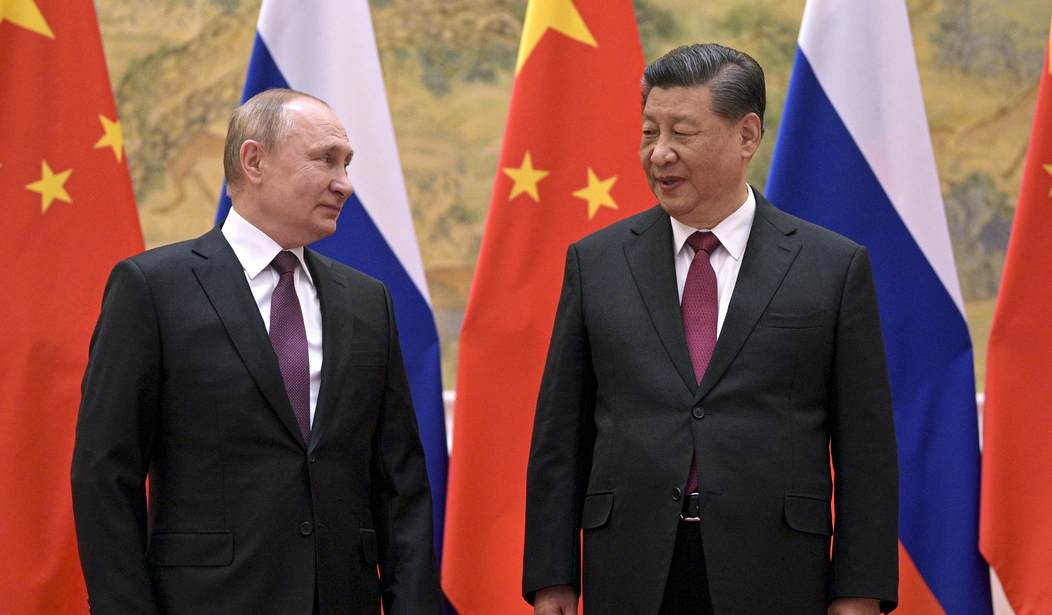Although the battle for control of Ukraine is happening half a world away from the U.S, most Americans make the incorrect assumption that, unless American troops are deployed as part of the forces promised by NATO Secretary-General Jens Stoltenberg, this will be another in the never-ending list of battles, conflicts, and skirmishes that may only have a nominal effect on America.
That doesn’t mean that there aren’t numerous economic implications to a major war in Europe. An argument can even be made that this conflict may actually benefit the citizens of the United States, even as it hurts President Biden’s wayward energy policies. That is because this war may finally serve as a wake-up call to President Biden that his reversing of Trump-era energy policy and enriching Vladimir Putin to the tune of hundreds of millions of dollars has only enabled Russia’s costly and destructive military endeavor.
Another enabling factor for this brazen Russian military is the weak posture projected by yet another Democratic Party President that has suffered the indignity of having a red line ignored by a ruthless dictator. As a result of these factors, the new European War will certainly usher in the arrival of what will most certainly be the most common theater of war for the future — the cybersphere.
In fact, over the past several weeks leading up to Russian military aggression in Ukraine, there were unrelenting waves of cyber-attacks targeting the country that still are continuing with no sign of slowing down. The weeks preceding the Russian invasion also saw hackers from Russia target western nations, as American intelligence agencies including the Department of Homeland Security (DHS), the FBI, and the Cybersecurity and Infrastructure Security Agency (CISA), issued numerous alerts warning against Russian cyberattacks.
America is already well acquainted with the potential of Russian-based cyberattacks, as last spring Russian cyberattacks caused major supply chain issues for both the food and energy sectors as a result of the JBS Foods and Colonial Pipeline hacks. Although damaging, these supply chain attacks would pale in comparison to infrastructure attacks that could possibly materialize as a result of information collected and backdoors obtained through perhaps the widest-ranging reconnaissance hack of all-time — The SolarWinds Attack.
The SolarWinds hack affected thousands of users of the popular Orion software through what appeared to be a normal software update. Victims included both private and public sector organizations, including some that manage critical American infrastructure.
Ultimately, SolarWinds was only one of countless reconnaissance hacking efforts carried out by Russian cybercriminals, many of whom fall under the state-sponsored APT category. Russian hackers had also previously attacked Ukraine with a very similar attack to SolarWinds as part of the 2015-2016 Petya/NotPetya hacks that also saw an update to a popularly used software program leveraged as the attack vector.
The cyber threat increases exponentially based on the recently announced enhanced partnership between Russia and China. The alliance was created to pose challenges to America as the world’s top superpower, as well as NATO as the “cornerstone of international security.”
The weakness exhibited by President Biden has also likely helped to usher in the new aggression in the territorial ambitions of both China and Russia. Although Russia has long desired to reclaim Ukraine, Putin never attempted to invade during the Trump presidency, while China, a country that was perhaps the last president’s highest geopolitical priority, has now repeatedly threatened Taiwan in the aftermath of Biden’s botched Afghanistan exit.
With America’s standing in the international community dropping to Obama-era levels, this new Sino-Russo alliance may dare to initiate a cyber offensive that is more destructive than any in history. That is because China is seen by many cybersecurity experts as the globe’s top offensive cyber-power. Over the past decade, we’ve seen China hack a U.S. Navy contractor working for the Naval Undersea Warfare Center in Newport, R.I. Additionally, in 2015, NBC published an NSA document revealing “more than 600 corporate, private or government ‘Victims of Chinese Cyber Espionage’ that were attacked over a five-year period, with clusters in America’s industrial centers.”
Should the new Sino-Russo alliance choose to leverage the vast trove of intelligence it has collected over the years, it would most certainly have a devastating impact against America from half a world away. The threat would only grow if the allies of both China and Russia, cyber powers North Korea and Iran, choose to involve themselves.
This global drama unfolding before our eyes will continue as long as Russia insists on retaking Ukraine. And now that Russian President Vladimir Putin has ordered Russia’s nuclear forces to go on high alert in response to statements released by NATO countries on Sunday, in addition to the cyberattacks that are sure to come, this is probably the closest the world has been to nuclear war since the Soviet Union fell.









Join the conversation as a VIP Member